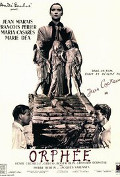
France 1949
Directed by
Jean Cocteau
95 minutes
Rated PG
Reviewed by
Bernard Hemingway

Orpheus
Jean Cocteau interweaves a considerable slice of autobiographical material into his re-visioning of the Orpheus and Eurydice legend in which the gifted son of Apollo loses, then retrieves, his beloved Eurydice from the Underworld.
Here Orpheus is Orpheé (Jean Marais, Cocteau's lover at the time), a successful but burnt-out poet scorned by the younger generation of bohemian artists who gather at the Café Des Poetes. When a younger rival, Cegeste (Edouard Dhermitte), is killed, his mysterious companion, The Princess (Maria Casarès), assisted by her chauffeur, Heurtebise (François Périer), removes the body and requests Orpheé to accompany her. It turns out that The Princess is an emissary from the Underworld and Orpheé is rapidly drawn into a stranger world than he could ever have imagined.
What all this means, if there is any meaning, to the general viewer is far from clear but what is undeniably captivating about the film is the way in which Cocteau, ably assisted by cinematographer Nicholas Hayer with the limited technical means available at the time, superbly recreates Orpheé's travels back and forth from the Underworld, a decrepit half-lit world of ruins run by wizened logicians.
Cocteau was somewhat of an artistic flaneur and from his line drawings which are used for the opening titles to the fashionable costume design to the artfully restrained mise en scène, the film has a studied gracefulness that is entirely apt to the dreamlike (albeit sometimes nightmarish) mood of the enigmatic story.
FYI: The film forms a loose trilogy with The Blood of a Poet (1930) and The Testament of Orpheus (1959)
Want something different?





